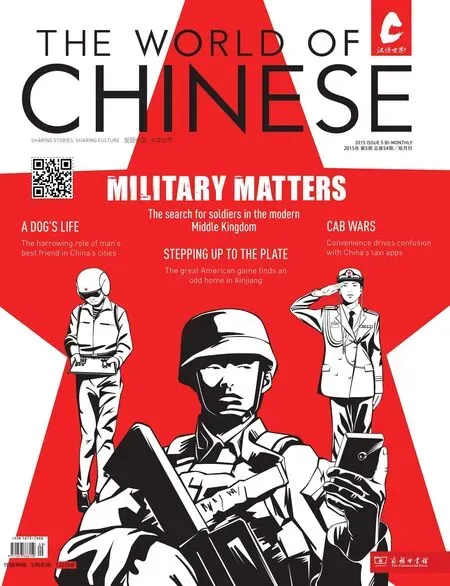MILITARY MATTERS
MILITARY MATTERS
How the hunt for soldiers and the soldiers themselves have changed
为了个人的前程还是光荣的使命?新时代的参军、军训与征兵
CHINA’S INCREASING ROLE IN WORLD AFFAIRS HAS PUT ITS MILITARY IN THE SPOTLIGHT. NARY A DAY GOES BY WITHOUT TENSIONS OVER ISLAND DISPUTES OR COMMENTARY ON CHINA’S GROWING MILITARY MIGHT AND ITS ROLE IN THE PACIFIC. BUT DESPITE THIS GROWING ATTENTION, THE ACTUAL MEN AND WOMEN WHO MAKE UP THE RANKS OF CHINA’S MILITARY GARNER FEW HEADLINES OR MUCH BY WAY OF PUBLIC UNDERSTANDING. DESPITE THE CHERISHED SLOGANS, HISTORY, AND SYMBOLS, PATRIOTISM IS NO LONGER THE GLUE HOLDING THE RANKS OF THESE ARMED FORCES TOGETHER. SOME JOIN TO MAKE A CAREER, SOME DO A SHORT STINT TO OBTAIN BENEFITS, WHILE OTHERS FEEL THEY HAVE NOWHERE ELSE TO TURN. IN SOME WAYS THE DEMOGRAPHICS OF THE MILITARY ARE CHANGING DRAMATICALLY, WITH RECRUITERS ADOPTING NEW TECHNIQUES TO LURE IN RECRUITS AND AN INCREASING EMPHASIS ON UNIVERSITY GRADUATES. IN OTHER WAYS, SUCH AS THE MILITARY TRAINING FOISTED ON ALL UNIVERSITY STUDENTS, THE SYSTEM SEEMS FIRMLY STUCK IN THE PAST. IN THIS ISSUE WE LOOK AT HOW AND WHY YOUNG CHINESE JOIN THE MILITARY AND THE WAY CHINA’S ARMED FORCES TOUCH THE LIVES OF EVERY SINGLE UNIVERSITY STUDENT IN THE COUNTRY.
FROM GRADUATE TO GRUNT
Li Hua, 22, a graduate of a junior college in Zhengzhou, Henan Province, decided to join the military. Her roommates tried to dissuade her, telling her that she would be wasting two years of her youth. They asked her: “How will you find a boyfriend and get married after the army, when your skin has turned dark and rough?”
Li says that for a young woman who lacks a diploma from a prestigious university, learning how to wear make-up, picking out chic dresses, and finding a reliable man to marry are actually incredibly important life decisions. Joining the army means wearing short hair, sweating under the sun, and running in muddy streams through forests while shouting slogans without emotion.
Every Chinese student learns the ancient story of Mulan (木兰), a story about a girl taking over her father’s military duties to become a soldier in an all-male troop; not every girl wants to become Mulan in real life. Nevertheless, Li compares herself to this fabled Mulan.“I cannot find a good job with a junior college degree, and I will not be able to pay back my student loan,” Li says. Li’s mother works as a domestic service worker in Beijing, making about 20 yuan an hour cleaning houses, cooking, and taking care of children. Her father, a construction worker in Zhengzhou, earns around 4,000 yuan a month.
Nothing upsets Li more than money, and she firmly believes that after a few years of life as a soldier, those troubles will disappear.
State media boasts that 10 percent of new soldiers in China every year come from Henan, and a college graduate like Li could get around 34,000 yuan in subsidies, as well as reimbursement for college fees.
Her original plan after finishing her two years of service was to work at a tech company like Alibaba or Tencent—perhaps even a startup in Beijing or Shanghai—but now she laments, “I could not even afford the rent there today.”In her hometown in Zhumadian, she grew up seeing red banners hanging in high schools and government buildings emblazoned with yellow words encouraging young people to join the military and contribute to the national defense effort. She did not take them seriously, but Wang Lizhi, 23, has been dreaming of becoming a soldier and remembers every word.
Wang’s parents work in the local health bureau and his grandfather, 69, was a soldier in the Vietnam War in 1979. In primary school, Wang excitedly tells his friends his grandfather’s war stories, such as how the Chinese soldiers outnumbered the Vietnamese ones, how they managed to win, but at the price of thousands of soldiers losing their legs, arms, and lives.
Wang studied medicine at the Sun Yat-sen University in Guangzhou and got his parents’ approval to suspend his studies to serve in the army in his sophomore year. Preferential policies for college students will allow him to resume his studies after finishing his service.
“I would miss the chance to be a real soldier if I didn’t register at this time, since I’m already 23,” Wang says. His classmates were shocked:“They care more about exam grades, the internet, and chasing girls.”
He said that not many college students keep up with the news like him, unfazed by confrontations among countries in the South ChinaSea or China’s new ADIZ in the East China Sea. But Wang worries about these things.


“The backwardness of the military, culture, and the economy will lead to a nation’s failure and suffering,”Wang says, adapting a quote by Stalin that was popular among China’s Party leaders half a century ago. “The backwardness of defense awareness is a worrying sign.”But, there are benefits beyond patriotic zeal; Wang points out that he will get bonus marks for the national postgraduate admission examination. The application process is straightforward. High school graduates, college graduates, and postgraduates under 24 are all eligible to apply for the military. They first register online and then go through rigorous physical tests and background checks before being formally enrolled.
With his parents’ approval, Wang is still waiting to do the physical tests. According to an employee at a military recruiting office in Heze, Shandong Province, who wished to be identified as Maoxiang, the authorities really want more educated college students, and provincial authorities assess grassroots recruitment work based on the proportion of college students. In 2013, military authorities shifted the recruitment time from winter to summer to suit the graduating season.“The PLA has been trying to get more educated soldiers,” Maoxiang says.
According to the Xinhua News Agency, the Chinese military started recruiting college graduates in 2001, and as of 2009, over 130,000 PLA soldiers were college graduates. Another Xinhua report claims that 10 percent of college graduates in 2013 were recruited by the PLA and the Armed Police Corps with the help of preferential local policies.
Preferential policies like covering tuition fees and increasing subsidies and job opportunities with the government and state-owned enterprises are promoted yearly in colleges around the nation, and military recruiters begin seminars and lectures at top universities in late spring.
Obviously, the military plays up the importance of receiving strict military training as a valuable life skill that fulfills one’s duty to the nation. Li Daguang, a professor at the National Defense University of the PLA, says that there are obviously exceptional candidates like Wang, who usually grow up in a military or government family but that, “Not many students join due to patriotism or a sense they are contributing to the defense of the nation.”
Maoxiang says he has met boys from the countryside with fantasies about soldiers and wars gleaned from anti-Japanese war-themed television shows who join the army with a wide-eyed sense of willingness. “Not all of them managed to secure a good job in the military or government, as they still need to finish college or pass the civil servant examination or postgraduate admission test. The government cannot reserve a job for everyone,” he says.
Cui Tian, a former soldier who left the army in 2008 and just returned from the UK after finishing a postgraduate program, says that serving in the military should not be seen as such a practical or mercenary decision by candidates, nor should the authorities try so hard to woo young people into the military. “In the two years I spent serving as a soldier in the Xinjiang military area, I made friends and proved that I was a man who could endure hardship and pressure. The ‘usefulness’ of the military service in a peaceful world was to enrich my life and teach me more about loving the country, rather than giving me a job.” -LIU SHA (刘莎)



SCHOOL OF HARD KNOCKS
Some say it is to “toughen up” little emperors and empresses cosseted by their parents and left physically feeble after years of dull, sedentary schooling. Others say it is to temper the students’ unruly willpower and render them obedient enough to properly serve the nation. Even more say it’s entirely pointless, while a large number see it as a bit of harmless exercise.
The truth is, nobody really seems to know what it’s for exactly, butjunxun(军训), the military training program foisted upon Chinese university students, isn’t going anywhere for the time being. First established in 1955 as part of the ideological governing framework of the Communist Party of China, compulsory military training was an intermittent aspect of life in high schools and universities for decades, until it received a boost in the wake of the political instability of the late 1980s. At Peking University, students were required for a time to receive an entire year of military training.
Now directed by the State Council with input from the Central Military Commission,junxunis only sometimes a part of high-school life, and no universities still require their students to train for that long. As for primary schools and secondary schools, the National Defense Education Law states that they can organize militarythemed activities on their own.
The authorities are fairly ambivalent on the length of the training as long as it is carried out, but two weeks is common. Althoughjunxunis run by military staff, the law places“institutions of education” in charge of ensuring safety. Effectively, the military conducts the training but schools are responsible if things go wrong—and sometimes they do.
This is likely a key reason why universities generally send a staff member to observe. One of these teachers, from a university in Beijing, toldTWOCthat the process varies significantly from school to school, but described it as “not arduous at all”. He said that the universities in the capital, aside from Tsinghua, send students to military facilities for the training rather than conducting it on campus. However, universities in less developed cities often hold the exercises on campus.
“It was around 2002 or 2003 that military training bases were established,” he said. “Their locations in the suburbs mean they are cooler than in the city. The food and accommodations are reasonable, and there are Muslim restaurants for those with dietary requirements. The best ones even installed air-conditioners.”By and large, the exercises are fairly tame, and students spend plenty of time joking around, marching, or singing nationalistic songs.
The patriotic songs include relatively modern titles like the 2010 song“Defend the Diaoyu Islands” which has the line “to defend the islands, we will kick off greedy and cruel bandits and safeguard our beautiful home, getting back our robbed treasure.” Other titles are older, dating back to the establishment of the PRC in 1949. A popular title is “I’m a Soldier” which was written in 1950 and released after the Korean War. It is one of the most popular military songs in China, and even those who aren’t involved in the military tend to know a few lines.
As would be expected of students anywhere in the world, some students speak fondly of thejunxunexperience, saying it was a time for bonding with classmates. Others shudder at the memory. Most merely shrug and say it was a compulsory class. “There’s not much to do [to motivate them],”the university employee says. “They already know that military training serves as a credit course, giving two credits, making it as important as any other normal course. I mainly just tell them how to be prepared and what to look out for.”
All students must attend, but as a series of rules issued by the Ministry of Education in 2007 points out, “if students have serious physical defects, are disabled, or have a serious illness they can apply tothe school for leave”.
In reality, bureaucracy makes things a bit murkier than this. “It’s supposed to be strict, everyone is supposed to do it. But in reality it’s hard to tell who is legitimately unsuitable for military training. In order to apply [for permission to skip training] they have to submit a medical record proving a medical condition or provide the results of a physical exam. If it’s a heart condition, of course they don’t have to go through with it, but if it’s something like a fractured bone they will need to attend the following year once they have healed.”
These exceptions have not always worked, however. And while most of the training may be fairly tame, a cursory search reveals over halfa-dozen fatal incidents across the country in 2014 and 2015. Deaths of high school or university students duringjunxunhave occurred in Shanghai, Qingdao, Xi’an, Wuhan, Yunnan, and a few in Hebei. The most recent incident was in the small Hunan city of Chenzhou in August, when on the second day of weeklong military training, a high-school student was scolded for not taking the training seriously. He was ordered to do jumping jacks. The student passed out and later died in hospital. The bulk of these deaths are believed to have occurred when students with health problems were made to do exercise.
Perhaps the most high-profilejunxunincident occurred a year earlier, in August of 2014, also in Hunan. Students at the Huangcang Middle School became involved in an altercation with the military trainers after some kind of interaction with a female student. Although the incident at first appeared to end amicably with a handshake, the trainers later returned with other military trainers, allegedly under the influence of alcohol, and began to order the students (who were the equivalent age of US high-school freshmen) to perform harsh exercises. The supervising teacher intervened but this set off a scuffle, and around 42 were said to have been injured. Many of the students are believed to have hurt themselves by hitting glass windows in frustration.
Cases like these remain rare, but they do feed into a public discussion on the need forjunxunin the modern age. Whether it remains in place without significant changes in future will depend in large part on how well its supporters can articulate their reasons for keeping it and whether its opponents can triumph over the almighty powers of inertia and nationalism.- DAVID DAWSON

THE PLA WANTS YOU
Tanks roll over American soldiers in a Korean trench declaring, “Judgment Day for American Imperialists”; soldier icon Lei Feng is backlit with a holy yellow light befitting a saint; and People’s Liberation Army (PLA) soldiers stand resolutely against a backdrop of airplanes and cornucopias of food. Propaganda posters in Soviet-style vibrancy and socialist-style courage used to be good enough for recruiting new soldiers. Today, you have the pop song “Little Apple” by the Chopstick Brothers. In July of 2014, China’s Ministry of Defense promoted a video of soldiers dancing in loosely choreographed steps to a naff, upbeat pop song, intercut with computer generated graphics of fighter jets flipping in the sky, military hardware rolling down the streets, and brave soldiers marching. The video went viral and is still lauded as a recruitment success. Whereas the focus used to be on what one can do for one’s country, now the focus is on the individual.
“In the past, we always talked about patriotism and the greatness of this career. But now, we emphasize selffulfillment, self-realization, and selfworth. To cater to young people, we focus on individuals more than before,” says a political instructor who wishes to be referred to as Chen Jiaxu. Holding the rank of Captain, the military academy graduate went on to say, “Personally, I think that, nowadays, when people choose their career, they care more about the money than before. People are more materialistic, so being a soldier no longer seems an ideal choice for them.”
Using the promise of adventure and self-fulfillment on young minds is hardly a new selling point when talking about military recruitment, but the PLA has had to move quickly in evolving its recruitment angles.Glorious Mission(《光荣使命》) gained a few headlines when it hit shelves a couple of years ago: a first person shooter in which players take on the Japanese for disputed islands—with an extra update that allows for a direct battle for the Diaoyu Islands. Developed by the PLA’s Nanjing Military Area Command and developer Giant Interactive Group, it is a long way from the Lei Feng posters of the past.
Glorious Mission’s fictional invasions fill a niche that has largely been the forte of Western-based developers, such asCall of Duty,Command and Conquer, andCounter-Strike. Fei Yongjun, president of Giant Interactive, commented on the release of the Diaoyu Islands expansion inChina Daily,saying that, “The online version will target teenage gamers and military buffs and help bolster national defense education among teenagers.”
China’s foray in the modern world of military recruitment is off to a slow start, but many think it’s working.
“You can see we use more popular elements, like the popular song‘Little Apple’. We want to show the young people a different image. But we are just starting out this way,”Chen says. “Some soldiers around me have said that they were attracted by these commercials, or even some of the TV shows themedaround military life. They thought it was cool.”

There are, of course, other modern methods: PLA commercials on ads before Youku videos, anti-Japanese dramas, and the ubiquitous yearly recruiting drive of the nation’s willing. But, this is the age of the internet, and it is an area where China’s military recruiters are having trouble.
The PLA—which is famously not a fan of the internet, having called it an “ideological battlefield” with“revolutionary potential” in the past—is still working on how to maximize social networking to get modern, educated soldiers. The Ministry of Defense began its Weibo and WeChat accounts in May of 2015; the idea however has been more to increase transparency rather than to recruit new troops.
However, regardless of how many anti-Japanese dramas are pasted on the television, regardless of how many video games promote the life of military service, regardless even of patriotism, the life of a soldier is famously grim. On this front, the military has responded with lighter requirements.
Last year’s recruitment drive—which starts annually in late July and early August—saw a relaxation of the soldier’s life and a few changes to entice willing recruits, including the addition of musical instruments and jukeboxes.
The authorities lowered the height requirements from 162 centimeters to 160 for male recruits, with a similar drop to 158 for women. Also, with China’s expanding waistlines, exceptions are being made for the portly PLA soldiers.
The greatest impact on recruiting numbers has traditionally come from the loosening and tightening of policy.“I think policy is the most influential aspect. About five years ago, the [job] placement policy changed...Soldiers [who aren’t promoted] won’t get a job unless they’ve served for more than 12 years. Fewer people applied after the policy took effect. But, the number of recruits is regulated by the authorities,” Chen says.
While soldier requirements have gotten easier, the job of military recruitment, however, has gotten harder. China has experienced explosive economic growth over the past few decades and few are willing to give up the comforts of modern life for a cold cot in Xinjiang. Li Daguang from the National Defense University of the PLA told theGlobal Timesearlier this year that a recruiting drive in Jinan hoping for 600 new recruits only received 500 applicants.
The promises of money, education, and a swanky job in a state-owned company do not hold the sway they once did. Indeed, parents used to bribe their child’s way into the military life, and while reports from Bloomberg claim that this practice still exists (80,000 to 90,000 RMB for a spot), it is no longer a future many parents want for their children, a possible side-effect of the one-child policy many have claimed. The military life, for better or worse, may not have the clout it once did, but the authorities are trying to make it appealing once again.
“People’s minds have changed. Because there is no war now, the military seems to be less valued,”Chen says. “In the past, people were willing to join the military because they were more patriotic and thought it was an honor, but now both the local governments and individuals pay more attention to the economy.”- TYLER RONEY
THE PROMISES OF MONEY, EDUCATION, AND A SWANKY JOB IN A STATE-OWNED COMPANY DO NOT HOLD THE SWAY THEY ONCE DID

